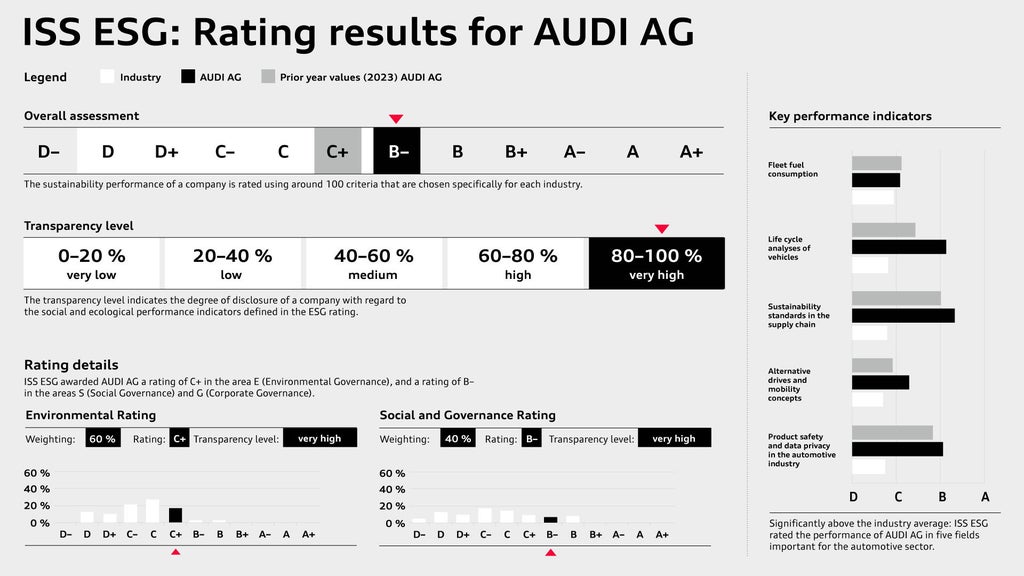ESG rating: Audi leads the way among car manufacturers
missing translation: fa.article-intro.reading-time – 07/21/24

Audi Q6 e-tron quattro: electric power consumption (combined): 19.6–17.0 kWh/100 km; CO₂ emissions (combined): 0 g/km; CO₂ class: A
Audi Q6 e-tron quattro: electric power consumption (combined): 19.6–17.0 kWh/100 km; CO₂ emissions (combined): 0 g/km; CO₂ class: A
Environmental, Social and Governance (ESG) topics are a core element of Audi’s corporate strategy. To create transparency and comparability across the automotive industry with regard to ESG performance, Audi was assessed for the second time by an internationally respected ESG rating process. The result: No other automotive company assessed by ISS ESG has achieved a better result to date for the 2023 financial year.
Experts assess more than 100 criteria
“Our goal is to be among the best in our industry,” says Jürgen Rittersberger, Member of the Board of Management of AUDI AG with responsibility for Finance, Legal Affairs and IT. “We are convinced that a good sustainability performance will improve our corporate value in the long term and help to future-proof Audi. The B– result goes one better than the rating achieved the previous year,” says Rittersberger. Based on the rating from June 14, 2024, AUDI AG ranks number one among 49 companies in the industry rating for the 2023 financial year.

ISS ESG rating “Automotive Industry”
More details
To create transparency for stakeholders with regard to the company’s ESG performance, to determine where it stands objectively in relation to its ESG targets and for comparability with the automotive competition, Audi was assessed by the internationally respected ESG rating process of the independent rating agency ISS ESG. The agency classifies the ESG performance of companies on a scale from A+ (excellent performance) to D- (poor performance).
60 percent of the overall ESG rating is derived from results from the E (Environmental) area, with 32 percent coming from the S (Social) area and 8 percent from the G (Corporate Governance) area. The rating agency ISS ESG analyzed the performance in the fields important for the automotive sector among others: fleet fuel consumption and vehicle life cycle analyses, sustainability standards in the supply chain, alternative drive systems and mobility concepts as well as product safety and data protection.
Publicly accessible information such as the Audi Report is the primary component of the ISS ESG rating. The combined annual and sustainability report brings together the financial perspective with sustainability criteria. The report provides the company’s figures on sales as well as operating expenses and capital expenditure in accordance with the EU Taxonomy. Additionally, it contains numerous contributions that explain the ESG strategy of the Four Rings and use examples to illustrate how Audi practices sustainability.
ESG performance in detail
Jürgen Rittersberger: “We already achieved a solid result in the 2023 rating and received important insight that showed us the areas where we have potential. We started from here and continued to improve.”
What did the analysts from the ISS ESG rating agency find particularly noteworthy with regard to sustainability and corporate governance?
- AUDI AG wants to achieve net carbon neutrality company-wide by 2050 *. The ISS ESG analysts found that the company is using appropriate measures to achieve this objective. The company’s efforts in the area of alternative drive systems and mobility concepts are significantly above the industry average according to ISS ESG.
- Among others, the company offers all-electric and hybrid vehicles.
- In terms of vehicle life cycle analysis, the company is performing significantly above average compared with its competitors.
- According to ISS ESG, AUDI AG has extensively addressed the risks in the supply chain and the due diligence obligations in relation to responsible sourcing of raw materials from controversial sources and from high-risk countries. The rating agency therefore views the Four Rings as performing significantly above the industry average. This can also be seen from Audi’s performance in relation to sustainability standards in the supply chain.
- In the area of product safety (e.g. crash tests) and automotive cybersecurity, the ISS ESG analysts found that Audi vehicles guarantee a high level of occupant safety.
- Sustainability targets are built into the variable remuneration of members of Executive Management at Audi. In addition, Audi is also addressing the topic of corporate governance with a comprehensive code of conduct and compliance measures.
A good rating result is not just important for financial analysts and capital investors. Other stakeholders are now also placing increasing importance on good sustainability performance: for example, customers who want to buy vehicles with a clear conscience. Partner companies, applicants, employees and local residents also expect a company like Audi to fulfill its responsibilities with respect to sustainability.
The new rating result for 2024 reflects the company’s endeavors to make a valuable contribution to society and the environment in addition to its business performance. The goal is to minimize the impact on the environment and to influence society as positively as possible. For example, the company is working continuously to use resources as carefully as possible, to increase equal opportunities in the company and to improve working conditions in the supply chain.

